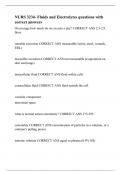Natural Law Essay
Assess the view that the primary and secondary precepts of natural law are unhelpful in
moral decision making
The primary and secondary precepts are part of Aquinas’ natural law which he developed to
help with moral decision making and influenced by God and the Bible. Aquinas claims that
we all have good in us, and guided by reason, we can achieve our telos and follow the
primary precepts to become God-like and perfect. This is a positive concept, however when
applied to everyday situations, natural law’s primary and secondary precepts are inherently
flawed: firstly, the primary precepts are too fixed and commit the ‘is-ought’ fallacy’, and the
secondary precepts can be easily misinterpreted, leading to slippery slopes and irreversible
damage, therefore, other methods within natural law may be useful, such as the Doctrine of
Double Effect.
Primary precepts were created by Aquinas and are absolutist rules, reflecting the Word of
God and can be found in everyone through the use of our reason and the Synderesis Rule of
“doing good and avoiding evil”. The five primary precepts include: worship God, ordered
society, reproduction, education, and defending the innocent. The absolutist nature of the
primary precepts makes them very helpful in moral decision making as they are rigid rules
for society to follow. In addition to this, the fundamentals of the primary precepts are
usually universally accepted in most modern-day societies as human rights, and so are easy
to follow and to apply. They also may be helpful specifically to Catholics, as natural law and
the primary precepts are particularly endorsed by the Pope, as they are a reflection of God’s
eternal law, part of the Four Tiers of Natural Law, and is God’s eternal plan and ideas in the
creation and in sustaining the universe in motion. In a world where morality is blurred and
there is a lack of absolute right and wrongs, the primary precepts can provide clarity and
consistency, and they are also easy to understand as they are a reflection of the natural
world. This can be seen through the precept of defending the innocent and the idea of not
murdering can be derived from this. Through an analysis of the primary precepts, it may be
argued that they are helpful in making moral decisions, due to their absolute nature and
accepted ideas.
On the other hand, the primary precepts may be incompatible with modern-day secular
societies, in which there has been a drastic revolution in sexual rights and other elements of
society, notably regarding gender roles. As the Pope claimed, “The church… in urging men to
the observance of the precepts of natural law... teaches as whatsoever of marriage must
retain its natural potential to procreate life”, which is derived from the primary precept of
reproduction. However, in society today, it should be argued that this is incompatible, as
through this idea, infertile couples should not have sex, and the primary precepts may look
down on people marrying in old age, as they cannot procreate. This is obviously an irrational
response to moral decisions and shows how there may need to be some leniency in the laws
in order for them to be adapted to modern day situations and ethical decisions. From this
example, it can also be observed that natural law commits the ‘is-ought’ problem, which
was created by Hume, as the precepts claim that something is like something, but this then
means that everything should also be like that, such as “sex creates life”, meaning “every
time a couple has sex, it should create life”, which is illogical and simply unrealistic.





